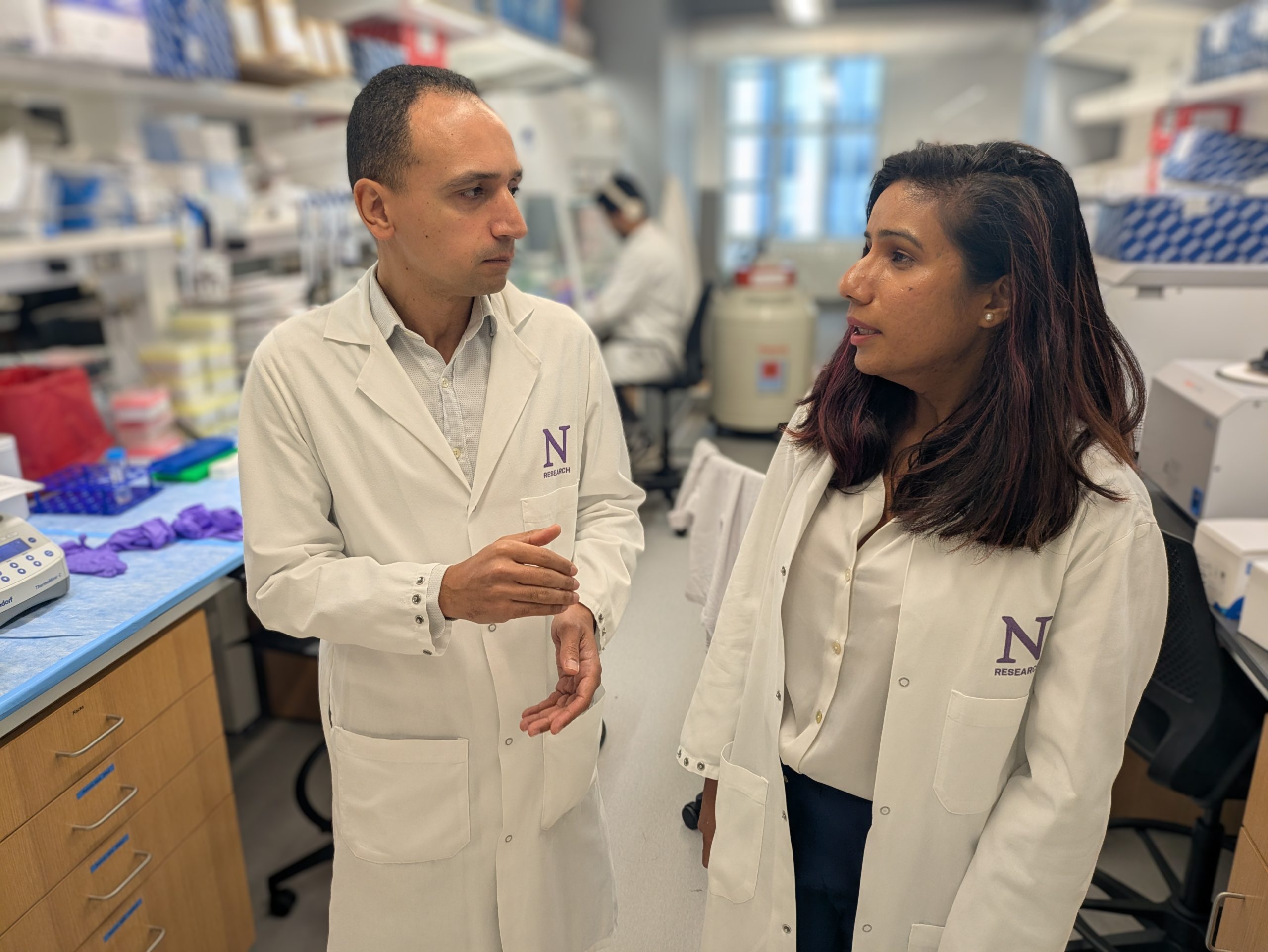Media Coverage
The work done by Northwestern University Feinberg School of Medicine faculty members (and even some students) is regularly highlighted in newspapers, online media outlets and more. Below you’ll find links to articles and videos of Feinberg in the news.
-
WGN Chicago
–
Freezing of federal grants causes concern at NU medical school
Susan Quaggin, MD, Chair of Department of Medicine at Northwestern University Feinberg School of Medicine, joins Lisa Dent to discuss concerns over federal funding being frozen by the Trump administration. Dr. Quaggin shares that across the entirety of Northwestern University, nearly 1,300 grants have been frozen, with 400 grants being frozen in the Department of Medicine alone.
-
USA Today
–
The trickle-down effect of President Trump’s massive NIH budget cuts
Millions of dollars in NIH research has now ground to a halt at universities across the country after the Trump administration cut studies it says are driven by diversity initiatives or a fixation on COVID-19. NIH grant money doesn’t sit in Washington – it gets funneled down to research universities across the country, where professors, graduate students, and doctors do their life’s work. At Northwestern University, just outside of Chicago, Benjamin Singer, MD, the vice chair for research in the Department of Medicine, said the university has been “very gracious” in helping his research group fill in the funding gaps to keep his research group’s work going. Singer treats patients in the intensive care unit, and some of his research focuses on how a specific cell can help rebuild a damaged lung – research that can benefit people suffering from pneumonia. His group also identifies targets for potential future prescription drugs. “I take care of critically ill patients at a high risk of dying,” Singer said. “When they’re really up against a tough spot, I think, ‘I wish we had better medications. I wish we had better therapies to help your mom, your son, your daughter.’”
-
US News & World Report
–
Turnaround Month In U.S. OD Death Crisis Pinpointed By Researchers
The turning point in America’s drug overdose (OD) crisis came in August 2023, a new study says. OD death rates are now in a sustained slow down after two decades of increase, researchers said. “This is an unprecedented shift in the modern drug crisis,” lead researcher Lori Post, PhD, director of the Buehler Center for Health Policy and Economics at Northwestern University Feinberg School of Medicine, said in a news release. However, the U.S. isn’t out of the woods yet, Post warned. The current OD death rate remains higher than any time dating back to the mid-1800s. “Even with this promising decline, drug overdose death rates remain near historic highs,” Post said. “Things are better but still not good.” For the study, researchers tracked the 800,645 drug overdose deaths that occurred between January 2015 and October 2024. Results show the national OD death rate increased from 14.5 deaths per 100,000 Americans in 2015 to 33.2 deaths per 100,000 in August 2023. More research is needed to figure out the exact causes of the turnaround, Post said. This is the first study to identify sustained declines in drug OD deaths versus temporary plateaus, she noted.
-
The Wall Street Journal
–
How Trump Blew Up Northwestern’s Business Model
In April, Northwestern University cardiologist Rod Passman, MD learned the National Institutes of Health had abruptly halted funding for a $37 million trial testing a new way to treat dangerous heart arrhythmias, with about 1,500 patients already enrolled. It was part of a universitywide funding freeze that threatened to stall hundreds of projects, including clinical trials with patients on lifesaving medication. Passman’s $37 million grant is testing a novel approach to treating atrial fibrillation, a heart condition that affects about 10 million Americans. Bouts of irregular heart rhythm cause blood to pool in the organ’s chambers, seeding clots that can break away and trigger strokes in the brain. Standard treatment involves a lifetime of powerful blood thinners to reduce the stroke risk, but patients are at risk for bleeding. Passman has talked to NIH program officers about his situation but said they didn’t tell him if or when funding would resume. If the university stops covering costs, and Passman fails to find backup funding, he expects to shut his trial down. Participants would go back to taking medicines, but it would waste years of work and millions of dollars to stop the project.
-
US News & World Report
–
AI Can Boost Radiologists’ Efficiency Without Sacrificing Accuracy
Artificial intelligence (AI) can boost radiologists’ ability to quickly and accurately assess people’s X-rays, a new study says. Some radiologists became 40% more efficient at reviewing images with the help of a custom-built AI program, researchers reported June 5 in JAMA Network Open. “This is, to my knowledge, the first use of AI that demonstrably improves productivity, especially in health care. Even in other fields, I haven’t seen anything close to a 40% boost,” senior researcher Mozziyar Etemadi, MD, PhD said in a news release. He’s an assistant professor of anesthesiology and biomedical engineering at Northwestern University in Chicago.Northwestern engineers built the AI system from scratch, using clinical data from the Northwestern Medicine network. The AI system analyzes X-ray imaging and issues a report that is 95% complete and personalized to each patient, researchers said. A radiologist then reviews the AI report along with the imaging scan and issues their own diagnosis. “For me and my colleagues, it’s not an exaggeration to say that it doubled our efficiency. It’s such a tremendous advantage and force multiplier,” said researcher Samir Abboud, MD, chief of emergency radiology at Northwestern Medicine. “On any given day in the ER, we might have 100 images to review, and we don’t know which one holds a diagnosis that could save a life,” Abboud said. “This technology helps us triage faster — so we catch the most urgent cases sooner and get patients to treatment quicker.”
-
New York Post
–
Menopause drug might prevent breast cancer and treat hot flashes, research finds
A drug intended to treat menopause symptoms could double as breast cancer prevention. New research from Northwestern University in Illinois found that Duavee, a Pfizer-made drug, “significantly reduced” breast tissue cell growth, which is a major indicator of cancer progression. A phase 2 clinical trial included 141 post-menopausal women who had been diagnosed with ductal carcinoma in situ (DCIS), also known as stage 0 breast cancer, according to a press release from Northwestern. This non-invasive breast cancer affects more than 60,000 American women each year, often leading to an outcome of invasive breast cancer. Duavee is a conjugated estrogen/bazedoxifene (CE/BZA) drug, which combines estrogen with another medication that minimizes the potential harmful side effects of the hormone. “The key takeaway from the study is that CE/BZA slows the growth (proliferation) of cells in milk ducts of DCIS that expressed the estrogen receptor significantly more than placebo,” Swati Kulkarni, MD, lead investigator and professor of breast surgery at Northwestern University Feinberg School of Medicine, told Fox News Digital. Another major finding is that the quality of life did not differ significantly between the two groups, but patients who took the CE/BZA reported fewer hot flashes during the study, she noted.
-
Fox News
–
Common menopause medication might prevent breast cancer while treating hot flashes
A drug intended to treat menopause symptoms could double as breast cancer prevention. New research from Northwestern University in Illinois found that Duavee, a Pfizer-made drug, “significantly reduced” breast tissue cell growth, which is a major indicator of cancer progression. A phase 2 clinical trial included 141 post-menopausal women who had been diagnosed with ductal carcinoma in situ (DCIS), also known as stage 0 breast cancer, according to a press release from Northwestern. “The key takeaway from the study is that CE/BZA slows the growth (proliferation) of cells in milk ducts of DCIS that expressed the estrogen receptor significantly more than placebo,” Swati Kulkarni, MD, lead investigator and professor of breast surgery at Northwestern University Feinberg School of Medicine, told Fox News Digital. Another major finding is that the quality of life did not differ significantly between the two groups, but patients who took the CE/BZA reported fewer hot flashes during the study, she noted. “This would be expected, as the drug is FDA-approved to treat hot flashes.” Kulkarni presented the study last week at the American Society of Clinical Oncology (ASCO) Annual Meeting in Chicago. The findings are preliminary and have not yet been published in a medical journal. “What excites me most is that a medication designed to help women feel better during menopause may also reduce their risk of invasive breast cancer,” said the doctor, who is also a Northwestern Medicine breast surgeon.
-
ABC 7
–
What to know about UK warning on weight loss drugs’ effect on birth control
Regulators in the United Kingdom issued guidance on Thursday, warning that weight loss and diabetes medications may weaken the effectiveness of birth control and may be harmful for pregnant women. This is because Mounjaro, a medication licensed to treat diabetes and for weight loss management in the U.K. in conjunction with diet and exercise, may reduce the effectiveness of oral contraceptives in those who are overweight. Christina Boots, MD, MSCI, a reproductive endocrinology and infertility specialist at Northwestern Medicine in Chicago, said she’s not sure if the recommendation for a backup form of contraception came from data seen during phase I or phase II clinical trials or if researchers saw more incidental pregnancies in those early studies. She said sexually active patients who are on weight loss medications should speak to their doctor if they’re concerned about getting pregnant. Boots said there are no formal guidelines on the use of GLP-1s in pregnancy. Studies done on rodents suggest there could be birth defects and problems with metabolic function, but no large studies have been conducted on humans.
-
US News & World Report
–
Troubled Kids Wait a Half-Day — Or More — In ER To Get Mental Health Care
About 1 in 3 kids who go to an emergency room (ER) amid a mental health crisis wait at least 12 hours to be transferred to psychiatric care, researchers report in the August 2025 issue of the Journal of the American College of Emergency Physicians Open. Further, more than 1 in 8 wait more than 24 hours before they are sent on to treatment, researchers found. “Our study underscores significant issues with access to mental health care for children and adolescents, who often face prolonged ED [emergency department] stays because a psychiatric bed is not available,” lead researcher Jennifer Hoffmann, MD, MS, behavioral health medical director for emergency medicine at Ann & Robert H. Lurie Children’s Hospital of Chicago, said in a news release. “As the youth mental health crisis continues, we have been seeing more severe psychiatric conditions in the ED,” she said. “Most of these kids seek emergency care at adult hospitals, which often have more limited pediatric resources compared to children’s hospitals and might not be prepared to provide the necessary supports.” For the new study, researchers analyzed records representing more than 5.9 million mental health ER visits for kids aged 5 to 17, using federal survey data collected between 2018 and 2022.
-
US News & World Report
–
How to Provide Long-Distance Caregiving
Supporting aging parents or loved ones from afar can be challenging, but with the right tools and strategies, long-distance caregiving is possible and meaningful. While it’s no easy task to be a long-distance caregiver, the following are some strategies you can adopt to streamline duties and be more organized in your approach. These include arranging family meetings, create a local network, schedule visits and prepare for emergencies. Communication is also very important. When you live at a distance, it’s harder to be informed about your loved one’s well-being. Set up regular check-ins with your family and their caregivers by phone or video calls so that everyone is up to date and well-informed about what’s going on. “If your loved one is cognitively impaired, they may not appreciate what’s happening to them, which will require you to adjust your way of communicating,” says Darby Morhardt, PhD, research professor at Northwestern University Mesulam Center for Cognitive Neurology and Alzheimer’s Disease. “ If this happens, it will be important for family members to recognize that their loved one’s capacity for decision making is diminishing, which will make them more dependent on the family. The more families can agree on their messages and next steps, the better for all.”






